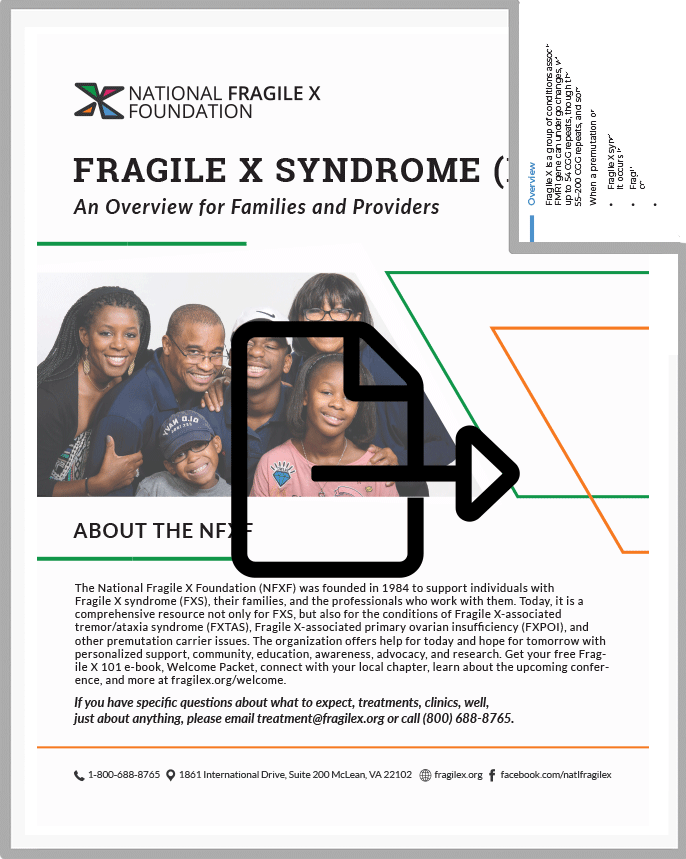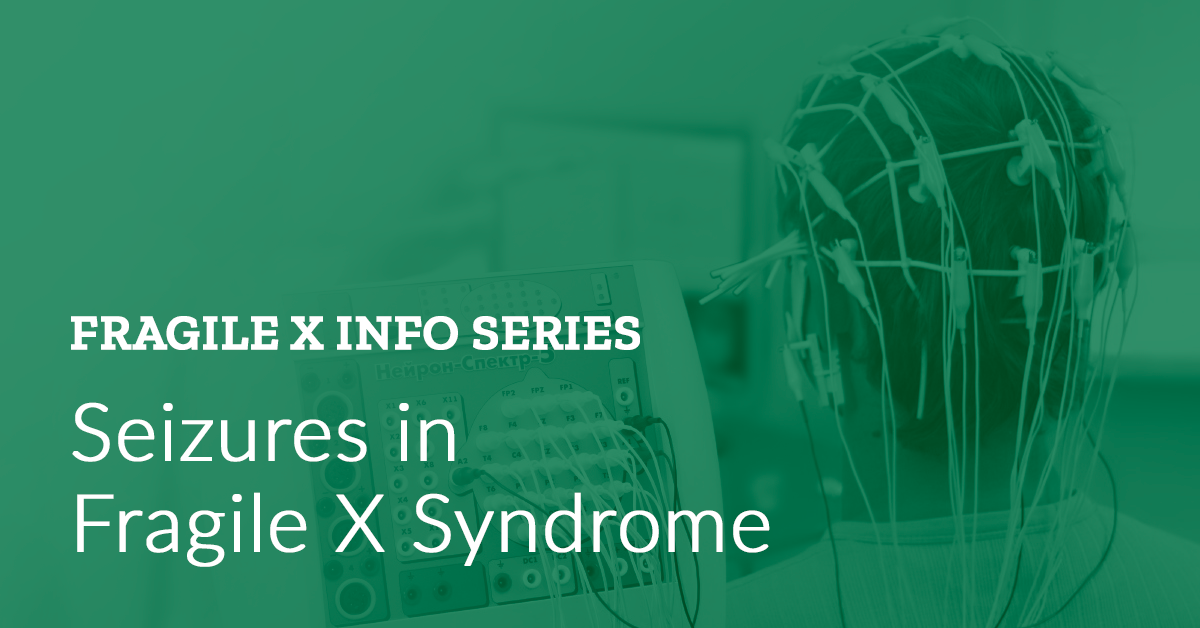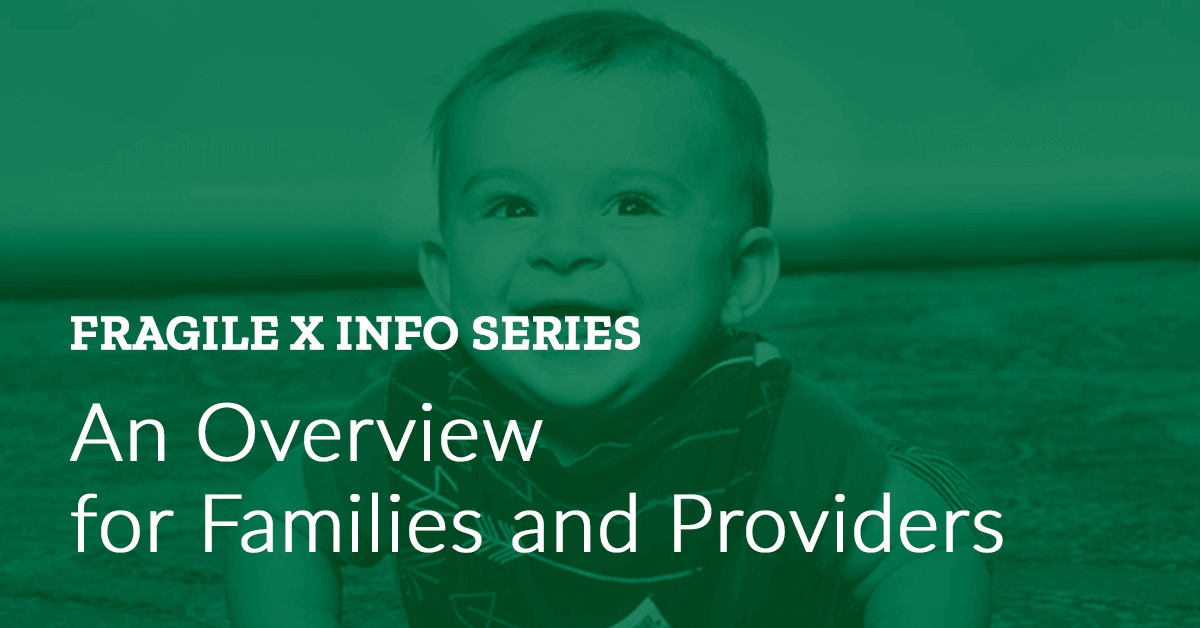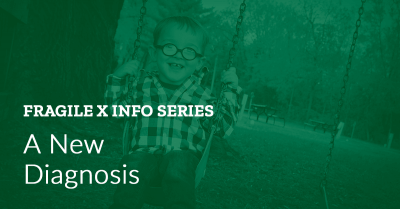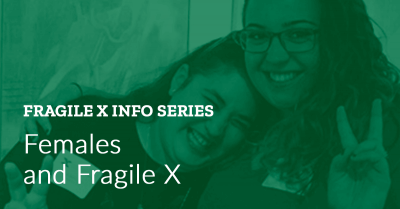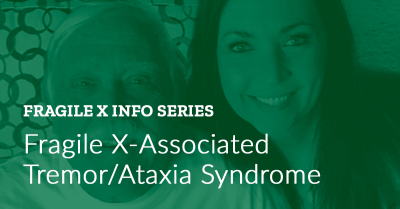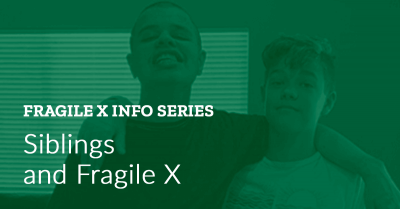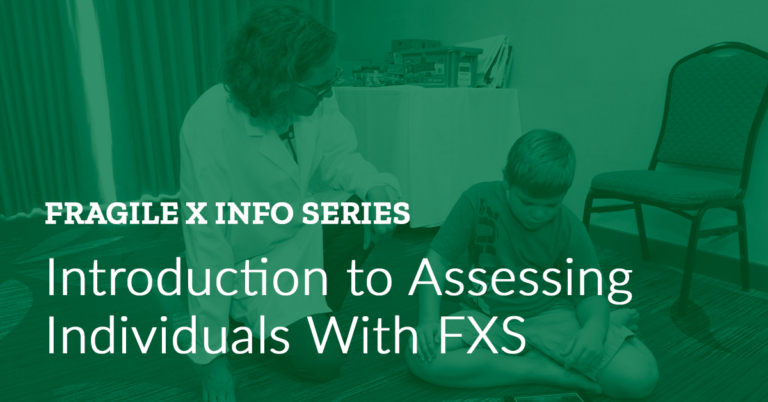Fragile X Info Series
overview of fragile x syndrome and associated disorders
Fragile X is a group of conditions associated with changes in the Fragile X gene. The gene (also known by its scientific name of “FMR1”) can be typical, or it can exhibit a “premutation” or a “full mutation.” When a premutation or full mutation is present, it can result in a Fragile X-associated disorder. These include:
FXS
FRAGILE X SYNDROME
FXS is an inherited disorder affecting intellectual, behavioral, and social development. It occurs in both males and females who have a full mutation of the FMR1 gene.
FXTAS
FRAGILE X-ASSOCIATED TREMOR/ATAXIA SYNDROME
FXTAS is an adult onset (over 50 years of age) neurological disorder, more common and more severe in males. It causes tremors, memory, and balance problems in those with a premutation of the FMR1 gene. (Both males and females who have a premutation are also referred to as “carriers.”)
FXPOI
FRAGILE X-ASSOCIATED PRIMARY OVARIAN INSUFFICIENCY
FXPOI is a condition affecting ovarian function that can lead to infertility and early menopause in some female carriers.
THE FMRI GENE
The FMR1 gene can undergo changes that cause these Fragile X-associated disorders.
These changes affect a pattern of DNA called CGG repeats.
Typically, the FMR1 gene has up to 54 CGG repeats.
A premutation in the FMR1 gene results in 55–200 CGG repeats, and a full mutation in more than 200 CGG repeats.
The range of 45-54 is called the “gray zone.”
OTHER PREMUTATION CONDITIONS
Research is currently underway looking at various issues that may be seen in people with the premutation.
Characteristics of Fragile X Syndrome
The following characteristics of Fragile X syndrome are usually more evident in males, but females can also demonstrate a range of features. No one individual will have all the features listed below.
PHYSICAL FEATURES
MAY INCLUDE:
- Large ears
- Long face
- Soft skin
- Flexible joints — particularly fingers, wrists, elbows
- Low muscle tone
- Flat feet
- High arched palate
- Large testicles (called “macroorchidism”) in post-pubertal males
Some of the features are due to poor connective tissue, such as flexible joints, flat feet, and high arched palate.
COGNITIVE ABILITIES
MAY INCLUDE:
- Cognitive abilities in FXS include a range from mild learning disabilities to more severe intellectual disabilities. The majority of males with Fragile X syndrome demonstrate moderate intellectual disability.
- Speech and language delay
- Motor delay (late crawling, walking, toileting)
MEDICAL ISSUES
MAY INCLUDE:
- Ear infections
- Strabismus (crossed eyes)
- Seizures
BEHAVIORAL CHARACTERISTICS
MAY INCLUDE:
- Sensory processing challenges (sensitive fabrics or clothing, loud noises, crowds, food textures, etc.)
- Hand-flapping, hand-biting
- Poor eye contact
- ADHD (attention deficit/hyperactive disorder)
- Anxiety
- Autism spectrum disorders
- Increased risk for aggression
- Sleep disorders
DISPOSITION CHARACTERISTICS
MAY INCLUDE:
- Very social and friendly
- Excellent imitation skills
- Strong visual and long-term memory
- Especially nice, likes to help others
- Wonderful sense of humor
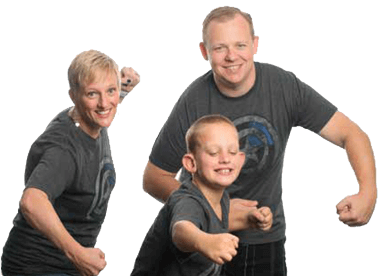
Treatment and Intervention
Research and clinical experience have shown that children with FXS may benefit from the following treatments and interventions:
- Early intervention such as infant development therapy and special needs preschool.
- Speech and occupational therapy, particularly sensory integration.
- Behavioral Therapies
- Special education (though many children with FXS are able to be “fully included” in an age appropriate classroom).
- Medications for symptom-specific issues such as anxiety, ADHD, seizures, etc.
- Fragile X clinic referral for consultation regarding educational and therapeutic strategies.
- To see the latest studies and trials, visit MyFXResearch portal.
Transition to Adult Services
For Individuals with Fragile X Syndrome
Adolescents and adults with FXS benefit from learning appropriate life skills. These programs can begin in high school and extend into adulthood, and should include education and guidance in matters of employment, social activity, recreation, independent living, and sexuality.
Inheritance of FXS
The FMR1 gene is on the X chromosome. Males have one X and one Y chromosome; females have two X chromosomes. In females with a full mutation, their other, normal X often compensates for the FMR1 mutation. That frequently results in milder symptoms of FXS. In males the Y chromosome cannot compensate for the effects of the Fragile X mutation.
- Both males and females can be FMR1 carriers and can pass the premutation on to their children.
- Male premutation carriers will pass the premutation on to all their daughters and none of their sons.
- Female premutation carriers have a 50% chance in each pregnancy to pass the premutation to their children of either gender. The risk of a premutation to expand to a full mutation is dependent on its number of CGG repeats.
- Only premutations carried by women expand to the full mutation that causes Fragile X syndrome.

Testing for FXS
Also see our Fragile X Info Series: Testing download.
- Any individual who has unexplained developmental disabilities, speech delay, ADHD, autism, or learning disabilities should be tested for Fragile X.
- The Fragile X test, also called the FMR1 DNA test, is not the same as a chromosome analysis or microarray, which examine all 46 chromosomes. However, a provider may order a number of tests in a child who exhibits unexplained delays in development. The test can be ordered by a genetic counselor or physician.
- Genetic counseling is recommended for any individual or relative of someone who has a positive test result, or a relative diagnosed with any of the Fragile X-associated disorders. A physician can refer you to a local genetic counselor or you can find one at the National Society of Genetic Counselors. Also, the genetic specialist at the National Fragile X Foundation can assist you — call (800) 688-8765.
How We Can Help
The NFXF is dedicated to serving the entire Fragile X community to live their best lives by providing the knowledge, resources, and tools, until, and even after more effective treatments and a cure are achieved. Learn more with Fragile X 101.
If you have questions please reach out to us at treatment@fragilex.org or call (800) 688-8765.


